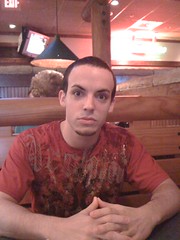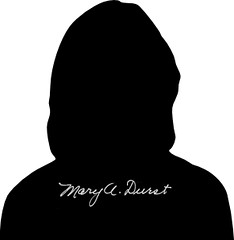
Ryan in Greensburg, Pennsylvania
Originally uploaded by walk4healthcare
Ryan is a young American. 24 years old, sporting an unassuming t-shirt and buzz cut, he exudes a personality simultaneously reserved and forthright. He has a gracious smile, offered with a twist of the head but then when he looks at you, with a piercing gaze, his face turns serious. As a writer, he seeks to deeply understand people, yet some things, like healthcare insurance, elude even his keen comprehension.
Brought up in a family who never had health insurance, Ryan is, nevertheless, a man with energetic, ambitions. After an early honorable discharge from the Army—for medical reasons—and a fruitless search for a job, he is working to finish his first novel, Ever Street Road, a parable, as he calls it, for the choices in life that one makes. Yet, in this great country, bursting with infinite possibility, Ryan has few, if any, choices. Infinitude meets finitude—this is America.
The future is but an illusion. Not knowing whether there will be healthcare for all or only healthcare for some, Ryan and I, sharing dinner, are focused on the present and the past. This is the only thing we truly know. The future, a future where the young ambitions of earnest, yet thwarted souls, might reach their full potential, is only a dream. Reality is how I met Ryan and what brought him to run up the hill to meet me on US 30 as 18-wheelers thundered past.
Just east of North Versailles, about 25 miles beyond my initial walking point, the last few miles trundled on through with pain. My feet—a jumble of collapsing arches, exploding blisters, and hemorrhaging nail beds—were beyond rebellion. I would have ordinarily arranged a pick-up to take me to the next hotel—now about eight miles east—but this had not materialized. And the transport for the bag—the 70 pound suitcased monstrosity—from which I live, had not been arranged. And despite the physical tribulations of walking nearly 24 miles a day, the most challenging part of the Walk has been the logistics. Lodging, pick-up (often the bunk down place is not necessarily on my walking route), and bag transport had all to be arranged. If any one of these elements fell through, the Walk would come to a standstill. At this point, I was not worried so much about that. With the sun now setting, knowing that I would soon be walking in the dark—the time when sounds become more important than sights—I was worried about my survival, concerned about arriving at the motel—if I made it at all—well after midnight. At the bottom of the hill, I had stopped at a McDonald’s to replenish myself with water and recharge my phone batteries. I slipped on my safety vest and grimly headed up the hill.
A young man, gasping for breath, came up beside me. Cars rushed by and instinctively motioned him towards the narrow shoulder.
“Are … are you Doctor Gurel?” he asked, wide-eyed, disbelieving. I was on the phone, still working feverishly to arrange transport of my bag. Too tired to be surprised, I smiled at him, and nodded. “I was following you on Twitter and … and I just had to come and meet you.” I hung up the phone, and out of habit continued on forward, as the young man joined me. “I’m Ryan, Ryan Trump,” he added.
“Oh yes! From Facebook!”
“Yes,” he said, his face twisting, searching for words to describe a situation for which there was no precedent. “Wow, I can’t believe this.”
“What?”
“That I met you here.”
I chuckled. “Crazy, isn’t it?” Ryan and I had exchanged some e-mails during the past few weeks on Facebook, and it was strange indeed that an entirely electronic friendship had materialized here on the not-so-isolated Lincoln Highway east of Pittsburgh.
And so we talked—talked with amazement about the GPS tracking technology that had brought Ryan to my very spot. We talked about healthcare. But I had to interrupt him. “Ryan, I have a problem.”
“What’s that?”
“My motel is about seven miles up, in Irwin. I have no pick-up to get there. Could you help out?”
“That’s the least I can do!”
I smiled weakly. Deliverance, in the form of Ryan Trump, shy but forthright, gracious but ambitious, had arrived. I was grateful for the wonders of technology and even more for the grace of initiative and real, not electronic, fellowship.
And so, after a couple of hours of back-and-forth driving, Ryan and I delivered the suitcase and myself to the motel in Irwin.
But that was the present. The following evening I had dinner with Ryan and we talked about the past. The present and the past: while this is what we know, we spoke out of hope for the future. A future with healthcare for all, and not just for some. A future where the imagined infinitude of possibilities cross with the crushing reality of no possibility.
“My family has never had health insurance,” Ryan told me. “My father worked in maintenance at the hospital for 36 years. And we never had health insurance but we could get care through the hospital.”
“That’s good,” I replied.
“Then the hospital closed, back in 2006, and he got laid off … but he was close to retirement anyway.”
“So what do you do now?”
“It’s difficult. My mom’s got a heart condition, had a heart attack back in 2000. You know it could always happen again. She’s got four types of drugs.”
“How do you pay for it?”
“It’s all out-of-pocket.”
“But you told me that you had troubles with the bank.”
“That’s just the way it goes—you pay for the medications when you can.”
I shook my head. “And how about for you? What’s it like to not have insurance?”
Ryan, who would usually look straight at me with those forthright, almost aggressive eyes, glanced down. “Well, you got aches and pains, but you think, ‘do I deal with the pain or do I go to the hospital and suffer accumulated debt? I’m 24 years old and my credit score is probably garbage. Can’t do anything in life with that, you know.”
I figured, listening between the lines, that Ryan had, in fact, gotten some healthcare, and the ‘accumulated debt’ he had referred to was real. “How’s the asthma?” I asked. (This was the reason for the honorable, medical discharge from the service).
“Oh, that’s not too bad. But there was this other situation.”
“What was that?”
Ryan thought for a moment, then looked up. “Well, I had a lump,” he said, pointing below the table.
24 years old young man, I realized that he was likely referring to testicular cancer—a condition made widely known by Lance Armstrong’s experience, and survival.
“Did you get it checked out?”
“Well, I was holding off for the longest time. But it was quickly getting bigger.”
My heart sank, but the fact of the rapid enlargement, encouragingly suggested to me that it wasn’t cancer. “And?”
“So I did go to the doctor eventually.” Ryan smiled and sighed. “He said it was some sort of hydrocele.”
“Oh yes, that’s good news.”
“They did an ultrasound … and, of course, I got all the bills. There was no way I could pay for them so I didn’t even open them up.”
An odd mix, a contradiction even, that with the wonderful news—namely that one did not have cancer—there came delivered a message of debt peonage that inspired even more despair than the dreaded diagnosis itself. It was almost as if the healthcare system itself was the cancer.



